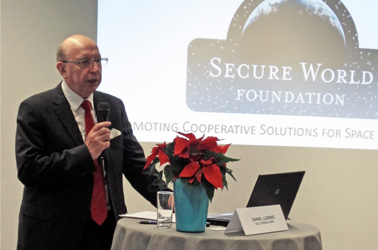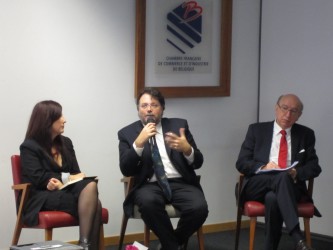Galileo takes off!
On 21 October 2011, the first two Galileo operational satellites were launched from the Kourou Space Center in French Guyana. This event was considered as a new milestone in the Space history and received considerable attention by the whole space community. Indeed it was the first time that the Soyuz Russian rocket was launched from the Kourou Space Center and obviously the emergence of the Galileo infrastructure.While two experimental navigation satellites, GIOVE-A and -B, were launched in 2005 and 2008 respectively, this double launch was the first of the four operational satellites designed to validate the Galileo system. A second launch of two satellites will follow in 2012. Initial Operational Capability (IOC) will be reached around mid-decade.
and Full Operational Capability (FOC) by this decade’s end.
Secure World Foundation event
Due to the importance of this event the Secure World Foundation (SWF) brought together on November 22 leading authorities to participate in a debate on Galileo, its current status and Future opportunities. SWF is a private operating foundation dedicated to the secure and sustainable use of space for the benefit of Earth and all its peoples. A press release underlines the main outcomes of this round table chaired by Agnieszka Lukaszczyk , European Program Manager at SWF.
Agnieszka Lukaszczyk, European Program Manager, Secure World Foundation, event moderator.
Michel Bosco, Deputy Head of Unit, EU Satellite Navigation Programs: Applications, Security, International Aspects, European Commission
Daniel Ludwig
Galileo :an investment for the European citizen
Personally, I spotlighted the economic benefits of Galileo, uses that are still not fully understood and therefore underestimated. The GSA (European GNSS Agency) has made sophisticated analyses which confirm what is already obvious from the observation of the last years: Galileo will bring enormous benefits confirming that indeed Galileo is an excellent investment. Mentioning that the benefits will come from the development of the applications, I consider that the budget allocated to the GNSS sector in the next Framework Program (8FP) is much too low and not consistent with the benefits expected with should have a direct impact on the development of SME and as a consequence creation of new jobs in a key innovative sector.
Interview to the webtv of the European parlement
I had the opportunity to develop the economical dimension of Galileo in an interview to Europarltv, the webtv of the European parlement.



